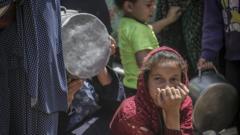How do you measure suffering in a besieged territory? For journalists, the immediate experience is crucial, but for those covering the ongoing crisis in Gaza, that access is increasingly denied. Despite the precarious situation, Palestinian reporters are risking their lives to deliver critical news from within the confines of war, with over 200 casualties among their ranks. With the Israeli government restricting foreign reporting, independent assessments rely heavily on information from humanitarian agencies currently operating in Gaza.
Recently, Pascal Hundt, the International Committee of the Red Cross's deputy operations director, articulated the dire circumstances civilians are enduring. He warned of an "overwhelming daily struggle" faced by the people due to military hostilities, forced displacements, and a severe lack of humanitarian aid. The escalated military actions, which resumed in March with substantial airstrikes, have obliterated hopes for progress towards a peaceful resolution, particularly after a two-month ceasefire was shattered.
The Israeli blockade has seen all humanitarian shipments, including essential food and medicine, halted since early March. Prime Minister Benjamin Netanyahu, facing political pressures from extremist factions, has promised intensified military operations aimed at displacing large segments of the Gazan population. This strategy has left families with mere minutes to flee potential bombardments, thrusting hundreds of thousands into life-threatening situations.
Philippe Lazzarini, the commissioner-general of the United Nations Relief and Works Agency (UNRWA), voiced his despair over the worsening conditions in Gaza, stating that starvation is now spreading among civilians. He highlighted that the region has seen more than two months without any significant aid, as they face impending famine that is exacerbated by the blockade's harsh realities. Data from the Integrated Food Security Phase Classification (IPC) supports these claims, indicating that Gaza is on the brink of famine, with 470,000 people trapped in a state of catastrophe.
Lazzarini accuses Israeli policies of using the blockade as a weapon of war and suggests that what is taking place could qualify as a war crime. This assertion raises serious questions about the potential for genocide, as deaths from malnutrition could outpace those from direct combat in the coming weeks. Reports suggest that Israel's defense minister views the blockade as a tactical advantage in its fight against Hamas.
Despite these allegations, Israel maintains that halting aid is crucial until all hostages taken by Hamas are released, igniting debate within Israeli society. Israeli Families Forum has voiced discontent with the government's approach, arguing that it prioritizes territorial ambitions over the safety of hostages. Meanwhile, a faction of dissident military reservists expresses concern over fighting to ensure political longevity for leaders rather than true security goals.
The ongoing conflict, marked by accusations of genocide, has drawn condemnation from various international bodies, including calls from nations like South Africa to investigate these actions at the International Criminal Court (ICC). Amidst growing global scrutiny, both local and international responses highlight the moral and humanitarian obligations at stake.
As this situation continues to unfold, Lazzarini warns that the international community has largely failed to intervene, allowing this "massive atrocity" to escalate. The conflict initiated significant changes in the geopolitical landscape, positioning Gaza as a potential pawn in regional power dynamics rather than a territory seeking peace. The historic implications of this conflict stretch far beyond the immediate ceasefire breaches, leaving the populace of Gaza at imminent risk of a humanitarian disaster that could redefine the region's future.
















